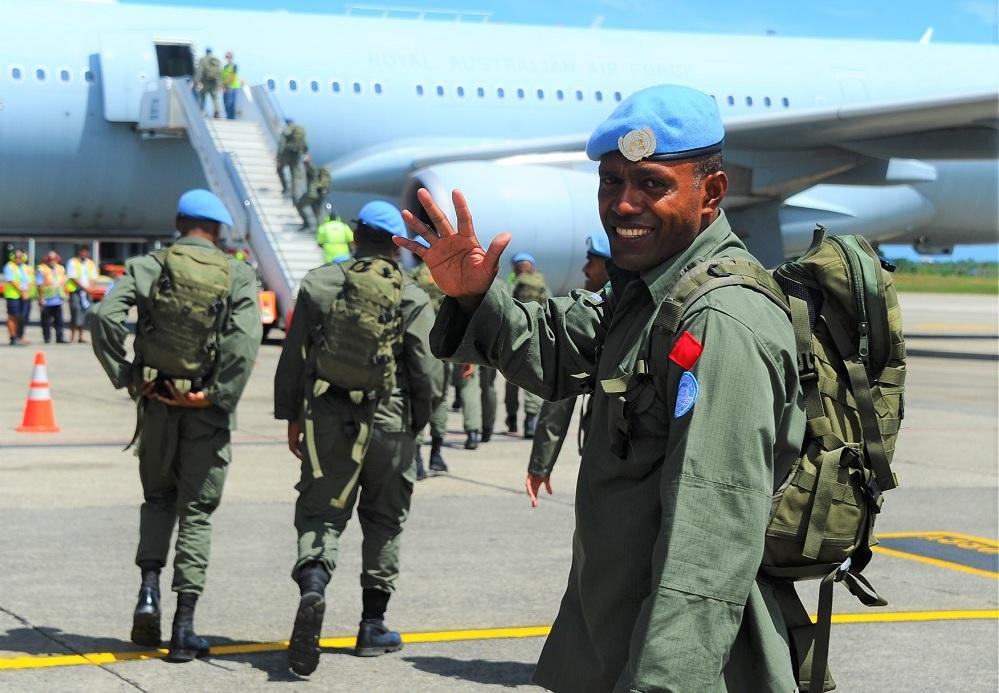Stepping up to the UN: Australia’s peacekeeping deployment with Fiji
Posted By Genevieve Feely on October 18, 2019 @ 12:33

During last week’s visit to Fiji, Prime Minister Scott Morrison said [1] that Australian peacekeepers would soon be joining Fijian peacekeepers in the Golan Heights as part of the United Nations Disengagement Observer Force (UNDOF).
The announcement doesn’t come as a complete surprise, but the timing is a little odd considering Morrison’s thinly veiled criticism [2] of the UN system in his speech earlier this month at the Lowy Institute. The idea of joint Australian–Fijian peacekeeping deployments was agreed to in the Fiji–Australia Vuvale Partnership [3], signed by Morrison and Fijian Prime Minister Frank Bainimarama in September.
There’s also been an increasing interest in joint military cooperation since the announcement of Australia’s role in redeveloping the Black Rock training facility in Nadi, which will act as a regional training hub for military and police peacekeeping.
But this is the first time specifics have been revealed, such as the mission that personnel will be deployed to.
Morrison’s statement—made to Australian players in a locker room at the PM’s XIII rugby league match in Suva—indicated that Australian troops would be sent to ‘train and support’ the Fijian contingent deployed to Syria. At the end of August, Fiji had 194 personnel [4] deployed there. There’s no indication yet of how many Australians will be going.
UNDOF has been mandated [5] since 1974 to monitor the ceasefire between Israel and Syria in the Golan Heights on the Israel–Syria border. Fiji has deployed [6] troops to UNDOF since 2013 and continues to make a sizeable contribution today. It has maintained its commitment despite an incident [7]in which 45 Fijian peacekeepers were held hostage by militants in 2014.
Australia has made contributions in the region through another longstanding mission, the UN Truce Supervision Organisation [8]. UNTSO was created to monitor armistice agreements in the region. Australia also appears to have deployed [4] a staff officer to UNDOF in May, perhaps an indication that preparations were being made for future engagement.
It’s not clear yet what form [9] the joint engagement will take. A number of different styles of co-deployments have been used in recent years that could provide a template. Australian personnel worked with [10] a unit of Japanese engineers at the UN Mission in South Sudan. Another good example [11] is the co-deployment of peacekeepers from Timor-Leste with a Portuguese contingent to the UN Interim Force in Lebanon, a partnership which provided a significant capacity-building opportunity for the Timorese. European nations regularly participate in joint deployments, allowing them to share the burden and responsibilities of contributing to peacekeeping missions.
Fiji has extensive peacekeeping experience and has been contributing significant numbers of peacekeepers since its first deployment [12] in 1978, particularly in the Middle East. In contrast, Australia’s contributions to peacekeeping have on the wane [13] for some time. Morrison made no mention of peacekeeping [14] in his recent address to the UN General Assembly, which suggests that it isn’t high on our priority list for engaging in UN activities.
Australia’s Pacific step-up is at the heart of this move. A joint deployment like this allows Australia to demonstrate its commitment to the Pacific region and at the same time fulfil its desire for greater defence cooperation and interoperability with the Fijian military in a live mission setting.
In this context, it’s important to ask what capabilities Australia will bring that Fiji hasn’t already developed over its long participation in UN peacekeeping. Confirmation of the exact nature of Australia’s contribution will shed some light on this key question. Its effectiveness will depend on how the Australian contribution is embedded into the existing Fijian contingent and how its command structure may change as a result.
For Australia, there are advantages in deploying peacekeepers to this mission and in this manner. Australian forces will benefit from working with their Fijian counterparts in an environment in which Fiji has had a sustained involvement. Australia’s familiarity with that part of the world through its commitment to UNTSO would also be a pull factor for the decision to deploy to the Golan Heights mission.
Deploying to peacekeeping missions also allows nations to be seen as good international actors. In recent years, Australia—like many developed countries—has been extremely reluctant to deploy to peacekeeping missions because of the risk of losing personnel. That’s a danger that comes with a political cost to any government that chooses to contribute to a UN mission, and many nations don’t see the deployment of their personnel as worth the risk. The co-deployment with Fiji shows that Australia is seeking ways of engaging in peacekeeping that benefit it and the UN, and also mitigate at least some of the risk.
A number of details still need to be filled in about this joint deployment. However, it should be seen as an opportunity to develop a model for future Australian peacekeeping engagement. The emphasis should be on being smarter and more innovative than before to allow for greater Australian contributions to UN peacekeeping. A well-structured and well-tailored co-deployment has the benefit of enabling Australia to demonstrate its commitment to the region while also fostering people-to-people links and enhanced defence cooperation.
Article printed from The Strategist: https://aspistrategist.ru
URL to article: /stepping-up-to-the-un-australias-peacekeeping-deployment-with-fiji/
URLs in this post:
[1] said: https://www.theaustralian.com.au/nation/politics/australia-to-send-peacekeepers-to-syria/news-story/0efbba796ae6d5569245f4acd96bad11
[2] criticism: https://www.lowyinstitute.org/publications/2019-lowy-lecture-prime-minister-scott-morrison
[3] Fiji–Australia Vuvale Partnership: https://dfat.gov.au/geo/fiji/Documents/fiji-australia-vuvale-partnership.pdf
[4] 194 personnel: https://data.humdata.org/dataset/76d1790e-1303-4284-a245-e9093419e357/resource/84591efe-1860-4723-8ef9-faa98e887050/download/odp_contributionsbygender.csv
[5] mandated: https://undof.unmissions.org/background
[6] deployed: https://undof.unmissions.org/fiji-arrival-undof
[7] an incident : https://www.abc.net.au/news/2014-09-11/captured-fiji-peacekeepers-released-un-says/5737772
[8] UN Truce Supervision Organisation: https://untso.unmissions.org/background
[9] form: https://www.ipinst.org/wp-content/uploads/2015/08/IPI-E-pub-Operational-Partnerships-in-Peacekeeping.pdf
[10] worked with: https://www.mod.go.jp/e/jdf/sp/no63/sp_specialfeature.html
[11] example: https://peaceoperationsreview.org/wp-content/uploads/2014/10/2012_argpo_timor_leste_mr.pdf
[12] first deployment: http://www.rfmf.mil.fj/history/
[13] on the wane: /australia-un-peacekeeping-70-proud-history-uncertain-future/
[14] no mention of peacekeeping: https://www.pm.gov.au/media/national-statement-united-nations-general-assembly
Click here to print.